Are you an adult who knows you need to reduce your screen time, but somehow you can’t stop looking at your phone?
Too much screen time- this has become kind of like a toxic relationship in itself. We love our phones and social media and all the comfort the internet and going digital have given us, but we also hate it.
We hate it because it is screwing up our sleep, our focus, our time, our routine, our studies and even our relationships.
As adults, we also have a lot of our work tied up to our screens and have to spend hours for our work in front of our screens every day.
Sometimes we may feel there’s no way out.
But we can always maintain a healthy balance by reducing our screen time outside of work.
However, most of us, even after our work come back home to again be glued to our screens on our phones, computers, laptops or iPads.
We want to reduce our screen time but we don’t know what to do or feel that we don’t have the willpower.
But as human beings, we are run by habits.
Just saying “I want to use my phone less” or “I want to reduce my screen time”, won’t fix the problem, because our habits of constantly being glued to our screen are too strong.
We don’t know what to do when our screens are away.
So through this post, I want to give you some helpful tips to reduce your screen time.
These tips if applied will help you not just in quitting mindless activities that you do in front of your screen such as scrolling your phones or watching too much Netflix, but also help reduce your screen time when it comes to your work-related activities.
They are working for me and I am sure they will for you too.
Read below to find out what they are.
But first,
How much screen time is good for adults?
Table of Contents
Almost all of us now are always online and always on our phones. Even if there’s no notification or anything, we still check our phones and are constantly in front of our screens.
There is no exact number on how much screen time is good for adults, but the less the better.
Experts generally say that we must spend just 1-2 hours in front of our screen outside of work and that we must have at least 4-5 hours of uninterrupted screen-free time in our day.
It might feel impossible now, but with little intention and experimentation, you definitely can.
Benefits of reducing screen time
If we could watch ourselves spending hours of time in front of our screen, we could see how much we tend to forget that we are alive or even remember that we have a body when we’re using our phones and computers.
Sometimes when we move away from our screens suddenly, we don’t even realize what we’re doing.
We’re just online lying there physically. On our phones, we’re so immobile, so inflexible, so rigid.
Reducing my screen time has definitely upped my well-being and how my mind feels. I now have more time to do the things I love and relax, without sacrificing my work.
To put it simply, here are the benefits I have seen in my life:
- More focus
- More feeling of freedom
- More time for things that I actually enjoy
- More Feeling of being in control
- More time reading
- Better wellbeing
- Better sleep routine
- Better sleep
- Better daily routine
- Less distraction
- Less mental noise and mental clutter
- Less anxiety and overwhelm
- Less curiosity in other people’s lives
Too much screen time on the other hand works exactly the other way around where it screws with your focus and makes you feel alone and controlled.
Even after spending hours with yourself being online, you still feel disconnected, as if you need more time for yourself.
It screws up your daily routine, your mental health, increases the mental chatter, makes you more anxious for no reason and also affects our relationships negatively.
Because of all such reasons, it is important that you learn how to reduce and limit your screen time so that you can use it in a well-balanced way.
Here I am not talking about completely cutting your screen time, but simply reducing it to a level that is balanced and meaningful for you so that you can live your life better and actually enjoy the things that you love to do.
So here it goes.
25 Helpful ways to reduce screen time
pin to save

1. Track your screen time
The first thing you have to do if you want to reduce your screen time is to start tracking your screen time and actually knowing how much time you’re spending in front of your screens.
The first thing you have to do if you want to reduce your screen time is to start tracking your screen time and actually knowing how much time you’re spending in front of your screens.
Also, another important thing to track is ‘when’- when you are most likely to use your screen for hours on end.
I found that for me, it was mostly after I came back from work and before I went to bed.
The thought of ‘Let me check just for some time’ would slip away and then I would be hooked on my phone.
Then I decided to just keep my phone away in another room after I came back home and before going to bed.
This reduced my screen time drastically and I could spend that time actually resting, napping and going to bed on time.
If you have an iPhone you can easily track your screen time by going to the settings.
For Android users, here is how you can track your screen time.
2. Make social media hard to use
Simply picking up our phone and going to different social media houses has become like a stimulus.
We open it because it’s so easy to open it.
We use it because it’s so easy to scroll and get hooked, now, especially with the short-form video content.
A simple way to reduce your social media intake is to make it hard to use.
Uninstall the app and use it only after you finish your other tasks or spend time away from it doing what you have to.
This helps because whenever you want to post something, you have to go through the process of installing it again and that is enough to make you stop and think whether it’s actually necessary to go to the platform.
Similarly here are other little ways to make social media hard to use:
- Don’t keep social media apps. Instead, use the web version. Apps are too easy to use and open.
They’re really smooth in the interface, making you stick with it longer.
I now only use the web version if I want to use them. I don’t keep its app on my phone, instead, if I want to use it, I will type instagram.com and log in from the web.
It’s so boring and difficult to use on the web version that I log out from it quickly.
Try it and you will see for yourself. - Always keep your social media logged out. If you don’t know your password, there is always a way to reset your password and log out of it.
This stops you from getting over to using social media for no reason, thereby upping your screen time.
Simply adding a little barrier helps a lot in getting rid of our bad habits.
3. Allow yourself to get bored
These days have you noticed how we never allow ourselves to get bored?
With all the apps and instant gratification, there is such an easy escape from boredom.
But boredom is actually essential for our growth and learning.
When we’re bored, it forces us to look into the matters that may need attention.
When we’re bored, it forces us to think and seek knowledge
When we’re bored, it forces us to seek out things to do.
When we’re bored, it forces us to look for things that are fun and engaging.
But our screens now have stopped us from that.
We hardly allow ourselves to get bored.
The moment we get bored, we turn to our phones.
This has resulted in neglecting what we truly have to do and getting consumed with instant gratification such as likes, comments and notifications.
If you want to reduce your screen time, allow yourself to get bored the next time you feel bored and don’t turn to your phones and screen.
Watch what ideas come up to you then and be mindful of what you might be neglecting and trying to escape from.
Do that instead. Find new things and seek learning.
4. Indulge in a screen-free hobby
Hobbies are important and you must take your time to find out what hobby you want to pursue outside of work.
Have things to do outside of your screen. There is so much to explore in life and we cannot find that out if we’re constantly in front of our screens.
Paint something. Doodle something. Learn nail art.
Make candles. Make soaps. Start a garden.
Beautify your balcony. Cook nice things.
Join a dance class. Find whatever that interests you. Seek out an exploration.
You must have something you want to do outside of your work that is purely for fun, that is only for you and that has nothing to do with money.
Here is more on why you should all make time for hobbies.
Plus, Screen-free hobby ideas.
5. Keep screens away one hour before bed
A rule that will change your life and will help you in improving your sleep and sticking better to your routine.
Decide on a bedtime and keep your screens away one hour before bed.
Nowadays I always keep my phone in the other room when I decide to go to bed.
This way, keep your screens away and spend a healthy bedtime routine instead.
If you’re married or have a partner, this will help in increasing your bond too instead of spending time on phones separately.
Here are 10 best things to do every night before bed.
6. Be Screen-free one hour after waking up
Another rule to follow – is to be screen-free one hour after waking up.
Go to bed by putting your devices on aeroplane mode. This will keep you from getting all the messages and notifications.
After waking up don’t turn off your airplane mode. Simply keep it away and use that one hour for yourself.
Let it be an appointment with only yourself and start a simple morning routine.
Here is a doable one-hour morning routine that works.
7. Make a List of things you want to do after work
Most of us tend to up our screen time when we’re back home from work.
We don’t know what else there is to do and find refuge in scrolling countless hours of social media or watching Netflix.
If this is a bad habit that you’re engaging in currently, it’s because you haven’t given much thought to what things you can do after work.
So make a list of things you would want to do after work. You will find that there are actually so many things you would actually want to do.
Give it some thought.
It might be cleaning your room, arranging your furniture, going for a walk, going for a swim, reading a book, starting journaling and so many other things.
The thing is, when you make a list and find out what you actually want to do or can do, you are more likely to do them.
P.S. I have created a 21-Day Journaling Guide for Self-discovery, growth and healing.
If you haven’t taken any other challenge of mine, you can join this challenge.
You will receive journal prompts and guidance from me for the next 21 days to inspire you every day.
8. Keep two desks
Recently I followed the suggestion from the book I last read ‘Steal Like an Artist’ to keep two desks- one digital and one screen-free.
I have done so and on my screen-free desk, I don’t keep any digital devices and only have my books, journals, planner and notepads.
Below is my screen free desk.
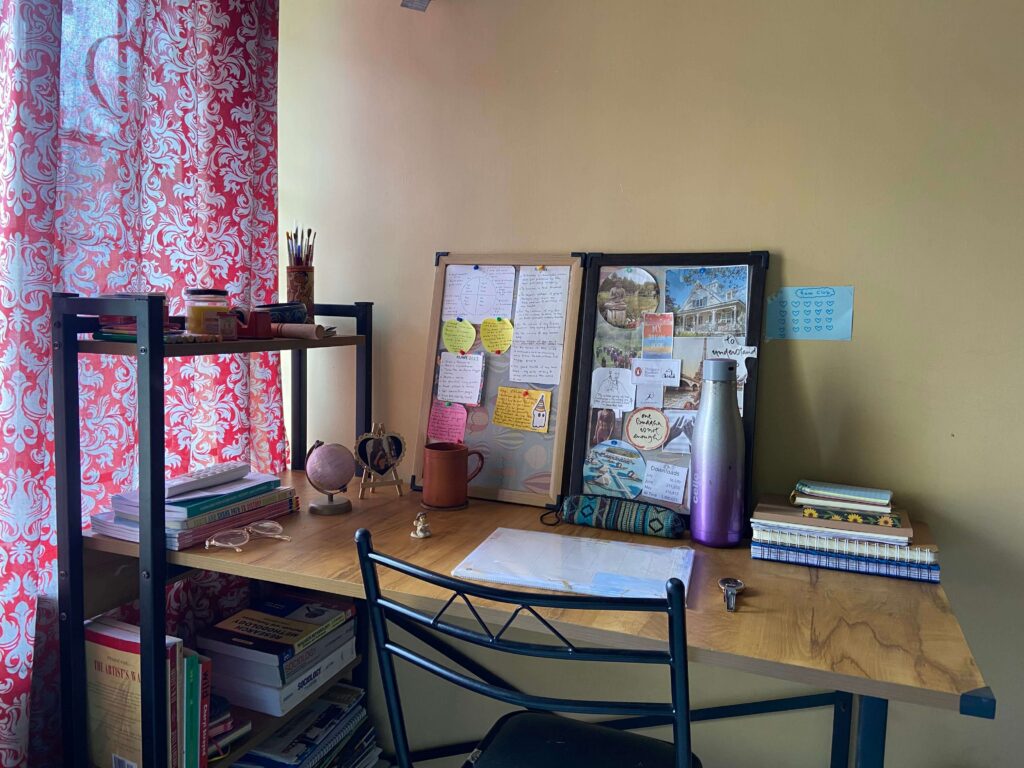
And This is my digital desk for my digital space and where I am doing my writing for now. Hope to have a bigger home office someday.
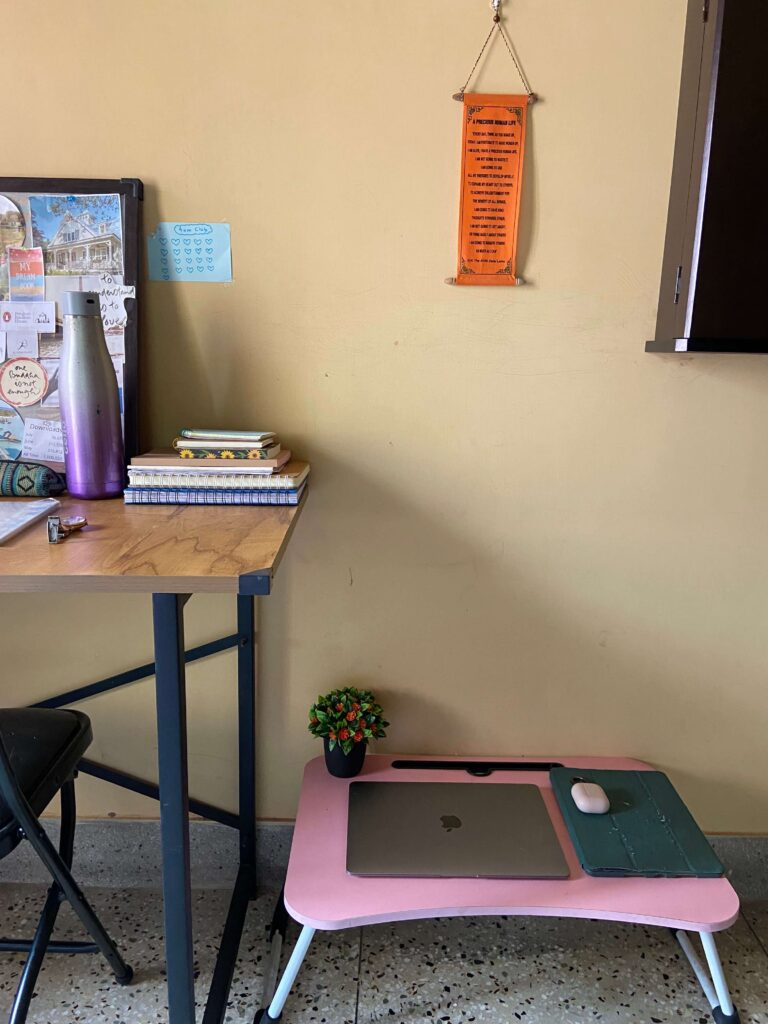
If there is any work that I have to do in front of my screen I am using my digital desk set up for that.
This has helped me organize my workflow into digital and screen-free and also to do as much work without any screens before I switch to my digital desk.
9. Use an analog clock
Keeping an analog clock on my desk recently has been so helpful for me.
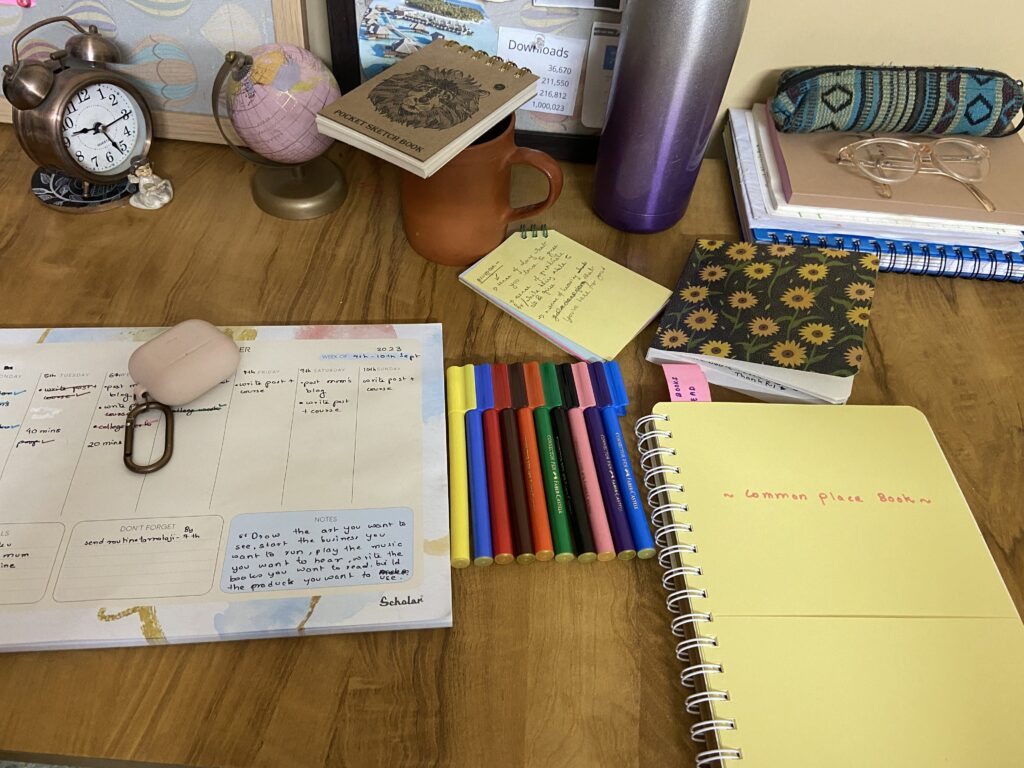
I don’t use my phone anymore to look at the time and I can’t believe how much less distracted I am because of it.
Earlier whenever I wanted to check the time, I would open my phone and then get distracted with a notification or some message or go somewhere else on my phone.
Now keeping two desks and additionally using an analog clock has helped me a lot in reducing my screen time and I am so happy.
If you want to get an analog clock for your desk or bedside too, check this one out.
10. Make your workflow as much screen-free as possible
Up until lately, I didn’t realise that I could make my work screen free too.
For writing on my blog, I do have to inevitably spend time on my screen, but I would also spend a lot of time on screen using digital planners, note-taking on my laptop or phone and writing my ideas on an app, instead of using a simple pen and paper.
But now I am trying to keep my work as much ‘with-hands’ as possible using pen, sketch pens, notebooks and paper.
And I am enjoying it a lot.
This has not only improved my focus but also I feel less drained and seem to have more energy.
So I recommend that even if you have to work online and use your screen, try to make your work as screen-free as possible if you can.
Keep all the planning stages screen-free and only use your digital devices only for actual execution.
Use notebooks, sticky notes, physical planners, pens, and sketch pens and you will see the difference too.
11. Don’t use your phone while lying down
A simple rule to follow but works wonders- Don’t use your phone lying down in bed
This is something I started to follow from my boyfriend.
He is someone who never uses his phone lying down in bed.
Soon even I started this habit on my own and yes, it’s possible.
Though sometimes I miss out on this on my off-track periods, but I think it’s because I start using my phone in bed while lying down that I go off track and waste my time instead.
12. Be strict about Screen free hours
Keep screen-free hours in your day and be strict about it.
It can be one hour to three hours of being screen-free.
If you have kids, keep screen-free hours for your kids.
You can also keep screen-free hours in the time you spend with your partner as well.
Devote that time solely to screen-free activities and doing things offline.
It helps to strengthen bonds with yourself if you live alone, and with your loved ones if you have a family.
13. Keep a screen-free zone in your home
Similarly, you can also keep a screen-free zone in your home.
It can be a part of your living room, your bedroom or even a separate screen-free room!
When you enter that room- no screens are allowed.
That way it would force you to do things that are screen-free and actually feel engaged with things in actual reality.
14. Eat your food screen free
I used to be someone who always had to have a screen in front of me when I ate my food. My father would always ask me to eat screen-free and eat our dinner together, but I would always go to our TV room to watch something as I ate my dinner.
Now that my father is no more, I miss our potential dinner time together and realize how much he was actually right.
If you’re living alone, try to eat your food mindfully and screen-free as much as you can.
And if you live with family, always have the rule in your home to have your meals together without a screen.
It’s these little moments that will be big moments when we look back.
P.S Gratitude for neutral things in life
15. Always keep a book with you.
Keep a book with you always by your bedside or in your bag so that you turn to it instead of your phone.
Get into the habit of reading a book even if it’s just a little instead of scrolling your phone.
16. Use commute time wisely
If you’re someone who commutes to work for long hours, use that time wisely instead of simply going to social media or watching something on YouTube you will get nothing off.
Keep a book with you always or much easier, is to listen to a good podcast.
If your commute takes 20 minutes going and 20 minutes coming, that’s 40 minutes of time for you to learn something new every day.
Just 30 minutes a day of listening to a good podcast can also change your life significantly.
17. Keep your work email and number separate
Use your work email only when you’re in your workplace.
In your phone, don’t have the work email logged in.
Remove it from your device by managing the settings.
If you can separate your work phone number too, the better.
18. Post less
Another simple, but helpful tip- Post less on social media.
I don’t know about you, but for me whenever I am posing something-especially stories constantly every day, my social media time increases.
I find that I get eager to keep on checking my stories again and again and see who watched them.
I guess it is a normal human response, but checking too much social media then feels draining both in time and in my energy.
I can actually feel my energy levels go down and my mind slowly getting scattered.
I post less nowadays and this has made me less interested in using social media and reduced my screen time. Lol.
However, if you are a business owner who depends on posting on Instagram, making reels and video content and constantly having to post stuff online, it is a must that you exercise self-discipline.
Set time limits or set certain times to use social media.
Make social media hard to use after posing so that you don’t spend too much time on the platform, comparing and checking and instead spend more time creating valuable content.
P.S my 3 tips to build self discipline
19. Hide apps that consume too much screen time
Identify the time-sucking apps.
Assess whether you really need it or something that you just go to when you’re bored.
When I decided to simplify my life and time, I got rid of many of the shopping apps.
I thought I needed them, but I actually didn’t. I would just scroll the app which would send my time, energy and money because I ended up buying clothes when I thought I had nothing better to do.
When I removed them, I missed nothing and I didn’t even remember them.
Identify the apps that are this way for you. It can be Netflix, YouTube or anything.
If you don’t want to remove them, you can always hide them. This too will help you in reducing screen time.
P.S 20 ways I simplified my life
20. Use an app to better your focus
If you constantly get distracted in your work and need better focus, there is a software called Freedom which helps you block all the apps you want to block for a specific period of time.
There is also one that I really like- it’s called forest.
The app helps you go phone-free for a specific period of time.
With Forest, you plant a virtual tree for a specified period of time. After you plant that free, you cannot exit the app and use other things on your phone. If you do, your plant will die.
As you keep adding up your focused hours, you plant more trees and you grow a forest. That’s how it works. And even though virtual, it does give you a boost in being focused and not wanting to let your tree die by using your phone.
21. Use reminders for break
For all of you who are workaholics and can’t get off work until something finishes, please don’t forget to use reminders for breaks.
Take breaks occasionally and don’t look at the screen for more than one hour at a stretch. This applies also to me as I tend to get up from my screen only once I get the thing done.
Taking breaks is always a wonderful thing.
P.S Manual for slow living: 8 practices to slow down
22. Turn off social media notifications
Little things such as turning off social media notifications also help in reducing screen time greatly because then we won’t get constant urges to check what happened or what’s new when a notification pops up.
Turn off notifications for all apps- especially social media.
23. Meet face to face
Try to meet as much face to face in meetings and avoid video fatigue.
Hold online meetings only when it is completely necessary.
24. Go grayscale
Another tip that I recently came across is to make your phone go grayscale. This will turn your entire phone into black and white.
The trick here is that going grayscale will make your phone less appealing and you won’t like to use it thereby reducing your tray scale.
I tried it one day and it really did make me feel like I didn’t want to see my phone anymore. It was so dull and boring.
You can try it too.
To go grayscale on iPhone you need to go to settings>> accessibility >> display and text size >> turn on colour filters.
For Android users, here is how to go grayscale
25. Be Mindful of your urges
Lastly, be mindful of your need to be online for no reason. Whenever something pops up on your screen, be mindful of what the app is trying to pursue you towards.
Don’t just be a careless consumer and start using your phone mindfully.
So these were my best tips on how to limit your screen time

I hope you will apply them and use these practices to reduce screen time and increase well-being and focus.
You might also like:

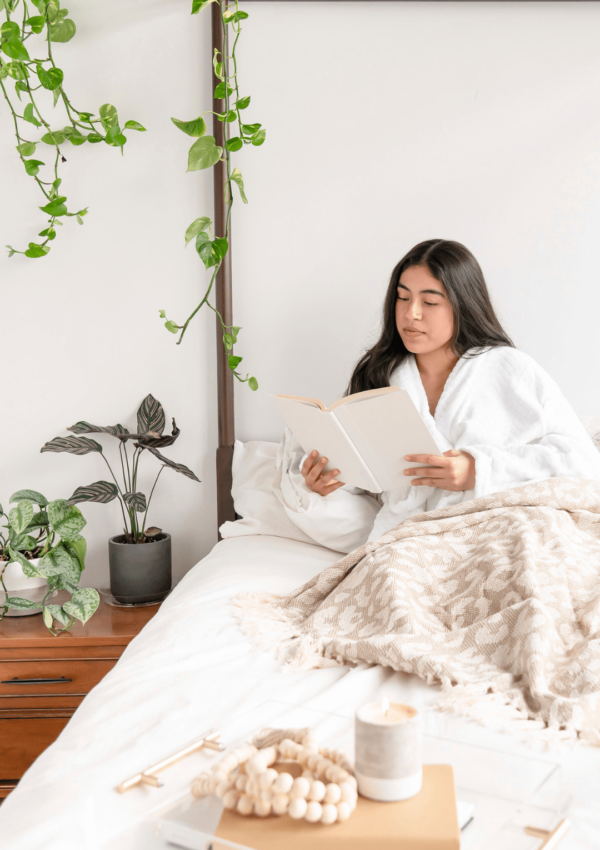
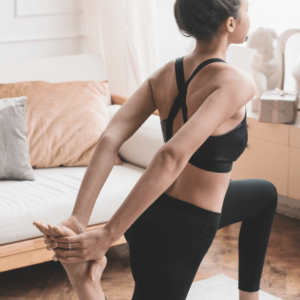



Leave a Reply